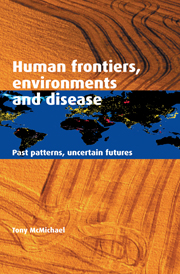Book contents
- Frontmatter
- Contents
- List of sources for illustrations
- Preface
- 1 Disease patterns in human biohistory
- 2 Human biology: the Pleistocene inheritance
- 3 Adapting to diversity: climate, food and infection
- 4 Infectious disease: humans and microbes coevolving
- 5 The Third Horseman: food, farming and famines
- 6 The industrial era: the Fifth Horseman?
- 7 Longer lives and lower birth rates
- 8 Modern affluence: lands of milk and honey
- 9 Cities, social environments and synapses
- 10 Global environmental change: overstepping limits
- 11 Health and disease: an ecological perspective
- 12 Footprints to the future: treading less heavily
- Notes
- Index
11 - Health and disease: an ecological perspective
Published online by Cambridge University Press: 05 March 2012
- Frontmatter
- Contents
- List of sources for illustrations
- Preface
- 1 Disease patterns in human biohistory
- 2 Human biology: the Pleistocene inheritance
- 3 Adapting to diversity: climate, food and infection
- 4 Infectious disease: humans and microbes coevolving
- 5 The Third Horseman: food, farming and famines
- 6 The industrial era: the Fifth Horseman?
- 7 Longer lives and lower birth rates
- 8 Modern affluence: lands of milk and honey
- 9 Cities, social environments and synapses
- 10 Global environmental change: overstepping limits
- 11 Health and disease: an ecological perspective
- 12 Footprints to the future: treading less heavily
- Notes
- Index
Summary
Western cultures are underwritten by views of human nature that deny connection and dependence. They are, let us say, atomistic.… We believe the basic social unit is an autonomous individual working out his or her self-interest under the watchful eye of the state. This is the heritage of the Enlightenment. We believe our species is separate from and superior to other species; we are, as we say, God's Children, and the rest of creation is, and should be, subject to our whims. This is the heritage of Christianity.
Jack Turner, 1996During the twentieth century we humans doubled our average life expectancy, quadrupled the size of our population, increased the global food yield sixfold, water consumption sixfold, the production of carbon dioxide twelvefold and the overall level of economic activity twentyfold. In so doing we had, by the turn of the century, exceeded the planet's carrying capacity by approximately 30%. That is, we are now operating in ecological deficit. These rates of change in human demography, economic activity and environmental conditions are unprecedented in history. This is why there is a need to seek an understanding, in ecological terms, of the underlying determinants of human population health. This is Big Picture stuff.
There are now serious questions about how we can reorient our social and economic priorities so that we conserve and reuse, rather than consume and despoil.
- Type
- Chapter
- Information
- Human Frontiers, Environments and DiseasePast Patterns, Uncertain Futures, pp. 318 - 340Publisher: Cambridge University PressPrint publication year: 2001
- 1
- Cited by



